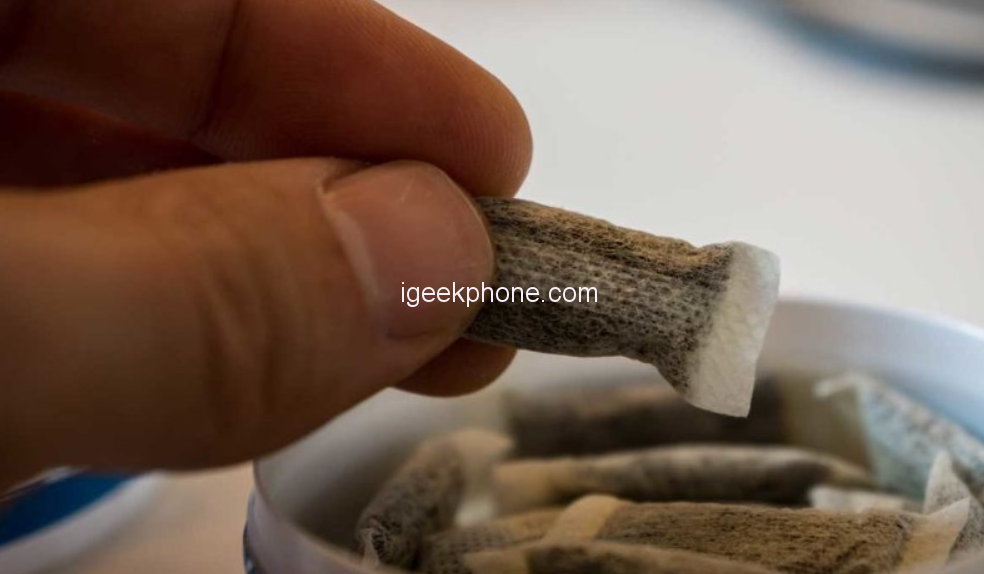The nicotine bag (also known as modern oral smoke) industry is a new industry that has developed rapidly in recent years. According to the Foundation for a Smoke-Free World (FSFW), nicotine bags generated an estimated $2.38 billion in sales worldwide in 2021. Market Reports World estimates that the global nicotine pouch market generated $5.86 billion in sales in 2022. The nicotine bag market is expected to continue to expand at a compound annual growth rate of 31% from now until 2028.
Market full of potential
Nicotine packs are attractive to consumers because they are designed to be used in places where smoking or aerosol products are prohibited, and then discarded like regular trash.
According to statistics, the world’s top five leading nicotine bag manufacturers account for a combined market share of about 82.2%. Swedish Match ranked first with 48.7% of the market, followed by British American Tobacco (about 20.3% of the market), Swisher International (about 6.4% of the market), Altria Group (about 5.4% of the market) and Japanese Tobacco International (about 1.4%).
Sweden and the United States are the world’s leading markets for nicotine bags. Both countries have a tradition of using smoke-free products. In the United States, the nicotine pack category now accounts for 2 percent of the tobacco market. One brand that stands out in the U.S. nicotine pouch market is Swedish Match’s ZYN brand. The brand went on sale in the US in 2016, and has seen sales continue to grow since its launch and is now the leader in the nicotine bag market. According to statistics, the ZYN brand accounted for approximately 66.5% of the US nicotine bag market share in the third quarter of 2022 and over 76% of the market share in the fourth quarter of 2022. ZYN’s market coverage is particularly strong in the western United States, where the brand was first launched.
Continuous increase in output
In recent years, Swedish Match has ramped up production of nicotine packs. When the ZYN brand debuted in the US seven years ago, nicotine packs were sold in about 40,000 retail stores in the western US. By the end of 2021, nicotine packs will be available at more than 120,000 retail stores in the United States. Swedish Match increased U.S. shipments of Zyn-branded nicotine bags from 114.1 million cans in 2020 to 173.9 million cans in 2021. In February 2020, the company announced an increase in capacity that will allow its plants to produce more than 200 million nicotine packs per year from 2022.
ZYN brand nicotine packs are made from nicotine extracted from tobacco and come in a variety of flavors, including coffee, cinnamon or citrus. Swedish Match has launched ZYN Menthol (mint flavor) and ZYN Chili (chili flavor) in the U.S. market.
In the United States, nicotine pack products are regulated by the Food and Drug Administration, marketed to an age limit and subject to premarket evaluation. Swedish Match filed a premarket application in March 2020 for its Zyn-branded nicotine pouch product to be sold in the U.S. market. These applications are reviewed by the Food and Drug Administration. Swedish Match said all ingredients in the ZYN brand nicotine bags met testing requirements. Studies have shown that many tobacco consumers are interested in ZYN brand nicotine bags.
The continued success of ZYN branded nicotine bags in the U.S. was one of the factors that prompted the purchase of Swedish Match. Owning Swedish Match would give the company a strong position in the U.S. nicotine pouch market, where it does not yet have such a presence.
In May 2022, Imer International offered to buy Swedish Match for about $16 billion. Some Swedish Match shareholders objected, prompting the company to raise its offer in October. However, Framtiden Partnership, which owns nearly 1% of the Swedish company, has rejected the improved offer, arguing that Fimer International undervalues Swedish Match’s true value in the fast-growing nicotine bag market.
Fierce market competition
Although the ZYN brand dominates the nicotine bag market in the United States, competition is fierce. According to Swedish Match, many companies are developing the nicotine bag market, and some are challenging Swedish Match.
On August 2, 2021, Dryft Sciences filed a lawsuit in the United States District Court for the Central District of California, alleging that Swedish Match used unfair competitive practices against it.
Dryft Sciences, Inc. was founded by Kretek International, the largest importer, marketer and distributor of specialty tobacco products in the United States, and specializes in the manufacture and sale of nicotine bags.
In a September 2019 announcement, Crete International announced that Dryft Sciences is significantly increasing its manufacturing capacity and launching its nicotine bag product globally. In 2020, the company produced 30 million cans of nicotine packs, and in 2021, 60 million cans.
Faced with a challenge from Dryft Sciences, Swedish Match asked the U.S. International Trade Commission to investigate Dryft Sciences, claiming that its nicotine bag product infringed its patent; It also filed a business claim against Dryft Sciences in the United States District Court for the Central District of California.
Dryft Science said in a statement that as a result of Swedish Match’s legal action, Dryft Sciences was unable to manufacture and market its product as intended. That has led to a sharp drop in the company’s market value. On October 20, 2020, Dryft Sciences sold its $485 million brand, formula, and other related assets to British American Tobacco for $150 million. Bat has since brought the Dryft Sciences product under its Velo brand of nicotine bags.












